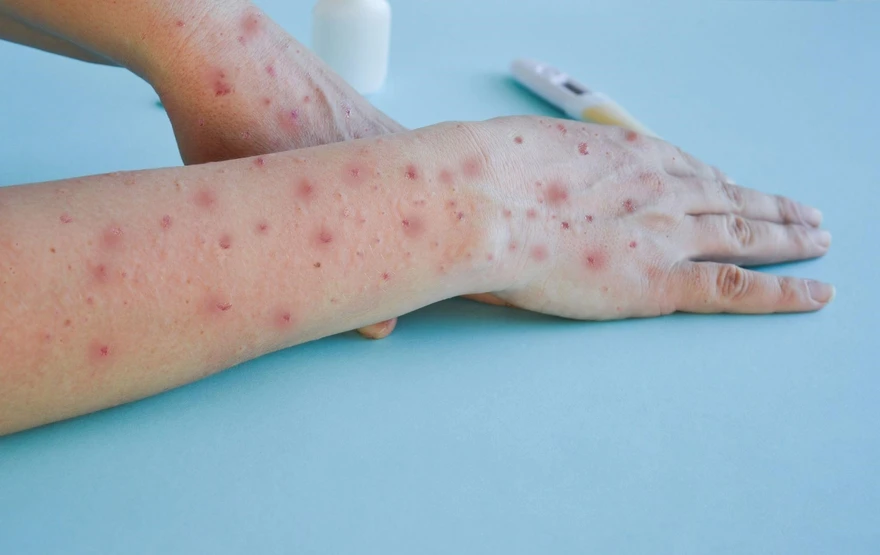Preventive Healthcare
Monkeypox (Mpox): Symptoms, Causes, Treatment, Spread & Prevention Guide

Table of Contents
- What is Monkeypox or Mpox?
- What is the difference between Monkeypox and Smallpox?
- How does Monkeypox or Mpox spread?
- What signs and symptoms indicate Mpox or Monkeypox?
- What are the complications of Monkeypox or Mpox?
- Risk Factors and Prevention
- How is Monkeypox or Mpox diagnosed?
- How to prevent the spread of Monkeypox or Mpox?
- Conclusion
What is Monkeypox or Mpox?
Often referred to as mpox, Monkeypox is an uncommon virus-borne illness connected to smallpox. It is a member of the same genus as the more well-known Orthopoxvirus, which is also a reason for the cause of smallpox. While similar, monkeypox is less severe.
Monkeypox, once a relatively obscure disease, has recently gained global attention due to its increasing prevalence. It's crucial to understand this virus to protect ourselves and our communities. While it is most frequently observed in Africa, it has also been found in other parts of the world. It is an unusual virus-induced sickness, causing a rash that might take weeks to heal along with flu-like symptoms like fever and chills. Mpox normally goes away on their own, even if there isn't a specific treatment.
What is the difference between Monkeypox and Smallpox?
While both monkeypox and smallpox are caused by similar viruses, they are distinct diseases. Smallpox is a more severe disease that was eradicated worldwide in 1980. Monkeypox, on the other hand, is less severe but still causes significant illness.
How does Monkeypox or Mpox spread?
Monkeypox spreads primarily through close contact with an infected person, their rash, bodily fluids, or respiratory droplets. The mpox virus can transfer from one individual to another via:
- Direct contact with the body secretions, rashes, or scabs of an mpox patient
- Close contact with respiratory droplets from an infected person
- Clothing, bedding, blankets, or other objects that have come into touch with bodily fluids or rashes on a person who is impacted
- The mpox virus can be passed from an infected pregnant woman to her child
- Animals can transmit the mpox virus to humans
What signs and symptoms indicate Mpox or Monkeypox?
Symptoms typically appear within 3-21 days after exposure. They include fever, headache, muscle aches, swollen lymph nodes, chills, and exhaustion. A rash often develops, starting as flat lesions that progress to raised bumps, blisters, and then scabs. The incubation period for monkeypox is usually 6-13 days but can range from 5 to 21 days.
What are the complications of Monkeypox or Mpox?
While most people recover from Mpox without complications, some individuals may experience:
- Secondary bacterial infections of the skin and soft tissues
- Encephalitis (inflammation of the brain)
- Pneumonia (infection of the lungs)
- Sepsis (life-threatening complication due to the body's response to infection)
- Corneal involvement (infection of the cornea that can lead to vision loss)
- Loss of vision (in severe cases)
- Myocarditis (inflammation of the heart muscle)
- Pericarditis (inflammation of the lining around the heart)
Risk Factors and Prevention
Anyone can contract monkeypox, but certain individuals are at higher risk, including those with weakened immune systems, pregnant women, and newborns. To prevent the spread of monkeypox, it's essential to practice good hygiene, avoid close contact with infected individuals, and get vaccinated if eligible. Vaccination against smallpox can also offer some protection against monkeypox.
How is Monkeypox or Mpox diagnosed?
Diagnostic techniques based on laboratories are essential for verifying mpox infection and establishing infection prevalence. While indirect testing reveals the patient's immune response, direct tests use nucleic acid amplification tests (NAATs) to determine the DNA sequences of the virus.
Early diagnosis is crucial for effective treatment and prevention. Several tests can detect the monkeypox virus, including:
- PCR (Polymerase Chain Reaction): This test detects the virus's genetic material.
- Blood tests: These can check for antibodies to the virus, indicating past infection.
- Image analysis: In some cases, imaging tests may be used to examine skin lesions.
How to prevent the spread of Monkeypox or Mpox?
Follow these precautions to stop the mpox virus from spreading or infecting healthy individuals:
- Avoid close contact with people who are having a rash similar to mpox.
- Avoid touching any items that have been used by an infected person or animal, including blankets, bedding, and clothing.
- Keep healthy people separate from those who have mpox.
- Wash your hands well with soap and water after coming into contact with an infected person or animal.
- Keep away animals who might be infected.
- Vaccinate against mpox.
Conclusion
Understanding monkeypox is essential for protecting yourself and others. By being informed about the virus, its symptoms, and how it spreads, you can take steps to prevent infection. Always consult with a healthcare professional for any concerns or symptoms related to monkeypox.




























